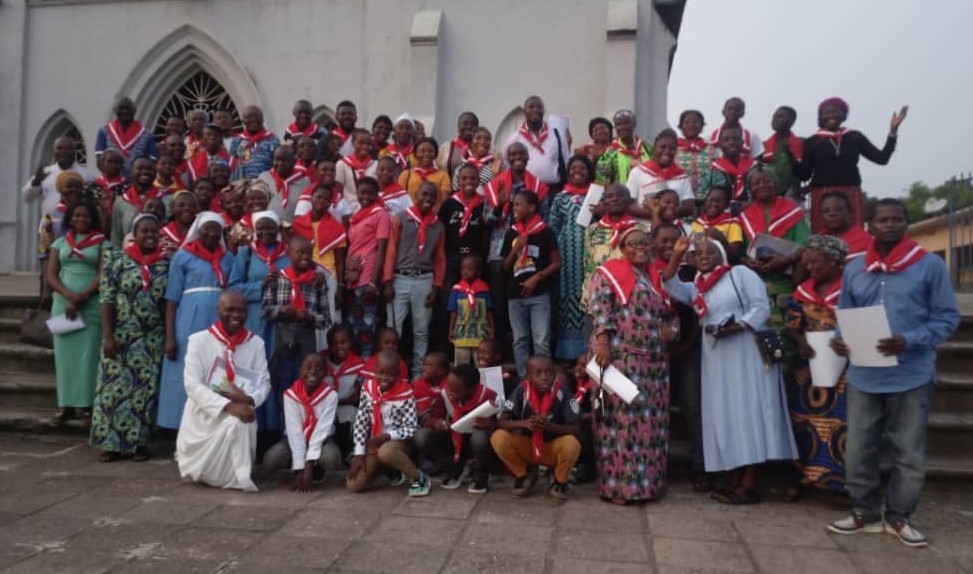
After the Kisangani Forum, A Catechesis on the Works of Mercy
Post Forum: catechesis on the reEvolution of the Works of Mercy at the Parish Cathedral of Our Lady of the Most Holy Rosary of Kisangani
From 18 to 20 September, a significant event took place for the Catholic Church in the Kisangani region: the forum on the reEvolution of the works of mercy, organized by spazio + spadoni in collaboration with the Archdiocese of Kisangani. This event brought together participants from different backgrounds to discuss and rediscover the works of mercy, with particular attention to how they can be updated and made relevant in today’s world
After this forum, Father Maximilien, parish priest of the Cathedral of Our Lady of the Most Holy Rosary, wanted to extend this impetus of reflection within his parish community. He then organized a special catechesis on the works of mercy, inviting Mr. Rodrigue Bidubula (representative of spazio + spadoni) to share with the parishioners his experience and the proposal of spazio + spadoni on the reEvolution of the works of mercy.
This event not only revived the importance of the works of mercy within the community, but also started a new dynamic to live them in a more concrete and current way in the parishes and in the basic ecclesial communities (CEV). The works of mercy, although defined for centuries, are still relevant and constitute the basis of Christian charity.
Father Maximilien, however, in connection with the reflection carried out during the space + spadoni forum on the reEvolution of the works of mercy, wanted to remind his parishioners that the works of mercy are not just isolated acts, but daily practices to be lived with a new, adapted to contemporary realities.

Catechesis: a moment of reflection and commitment
During the catechesis, the parish community of Our Lady of the Most Holy Rosary gathered enthusiastically to listen to the teachings on the works of mercy. It was a moment of great joy and spiritual enrichment for the participants, who were able to deepen their knowledge of the works of mercy and reflect on their role in today’s society by updating them.
However, beyond this traditional interpretation, this post-forum catechesis was organized to invite and stimulate parishioners to think about how these works can be experienced in a new way in an ever-changing world.
It was also a space to see together current challenges such as growing poverty, internal conflicts that cause massive population displacements, social injustices and health crises,… asking how Christians can respond to these challenges with a spirit of works of mercy .
According to him, it is essential to reappropriate these practices to adapt them to modern situations, keeping their spiritual essence intact.
Experiencing the reEvolution of the works of mercy today
The key theme addressed during this meeting was the concept of “reEvolution” of the works of mercy, as proposed by spazio + spadoni during the forum. The concept of reEvolution understood by spazio + spadoni refers to the return to the profound meaning and importance given to the spiritual dimension of the works of mercy, where the material act must be accompanied by a prayer, where dignity is fundamental to humanize the works .
Rodrigue, in his speech, insisted on the importance of going beyond fixed institutional frameworks to reach out to the most vulnerable in new and unexpected contexts. He provided concrete examples of Christian communities who have been able to adapt the works of mercy to local contexts.
In some parts of Africa, for example, parishes have established support systems for refugees or internally displaced people, while others have developed initiatives to help the elderly and those without the means to support themselves treat or combat food insecurity the economic and climate crisis is aggravated by food insecurity. And this also implies a spirit of collective entrepreneurship, service and volunteering to help those in need.
Parishioner Engagement: A Transformed Community
One of the great successes of this catechesis was the sincere and collective commitment of the parishioners of the Cathedral of Our Lady of the Most Holy Rosary. The meeting was not limited to theoretical teaching, but led to decisions and concrete projects to be implemented in the parish.
In the words addressed to spazio + spadoni through his representative he writes: “Thank you very much, Mr. Rodrigues, for this evening’s summary on the works of mercy towards the Christians of the cathedral. Through different circumstances and different teachings, we will see how to make our parish a field where the works of mercy are cultivated, from our families up to the parish level.”
Participants expressed a desire to fully experience the reEvolution of the works of mercy, mobilizing and strengthening solidarity among community members and working together to respond to urgent needs within their community. Father Maximilien announced that a committee will soon be formed to coordinate these initiatives and ensure regular monitoring.
The catecheses organized by Father Maximilien, with the support of spazio + spadoni, marked a turning point in the life of the cathedral parish of Kisangani. By reaffirming the importance of the works of mercy, updating them to respond to contemporary challenges, this meeting gave new life to commitment within the community. The parishioners, inspired by the teachings received, made the decision to experience this reEvolution of the works of mercy in a concrete and lasting way. This movement is not limited to the parish of Our Lady of the Most Holy Rosary, but echoes a broader dynamic that runs through the universal Church.
